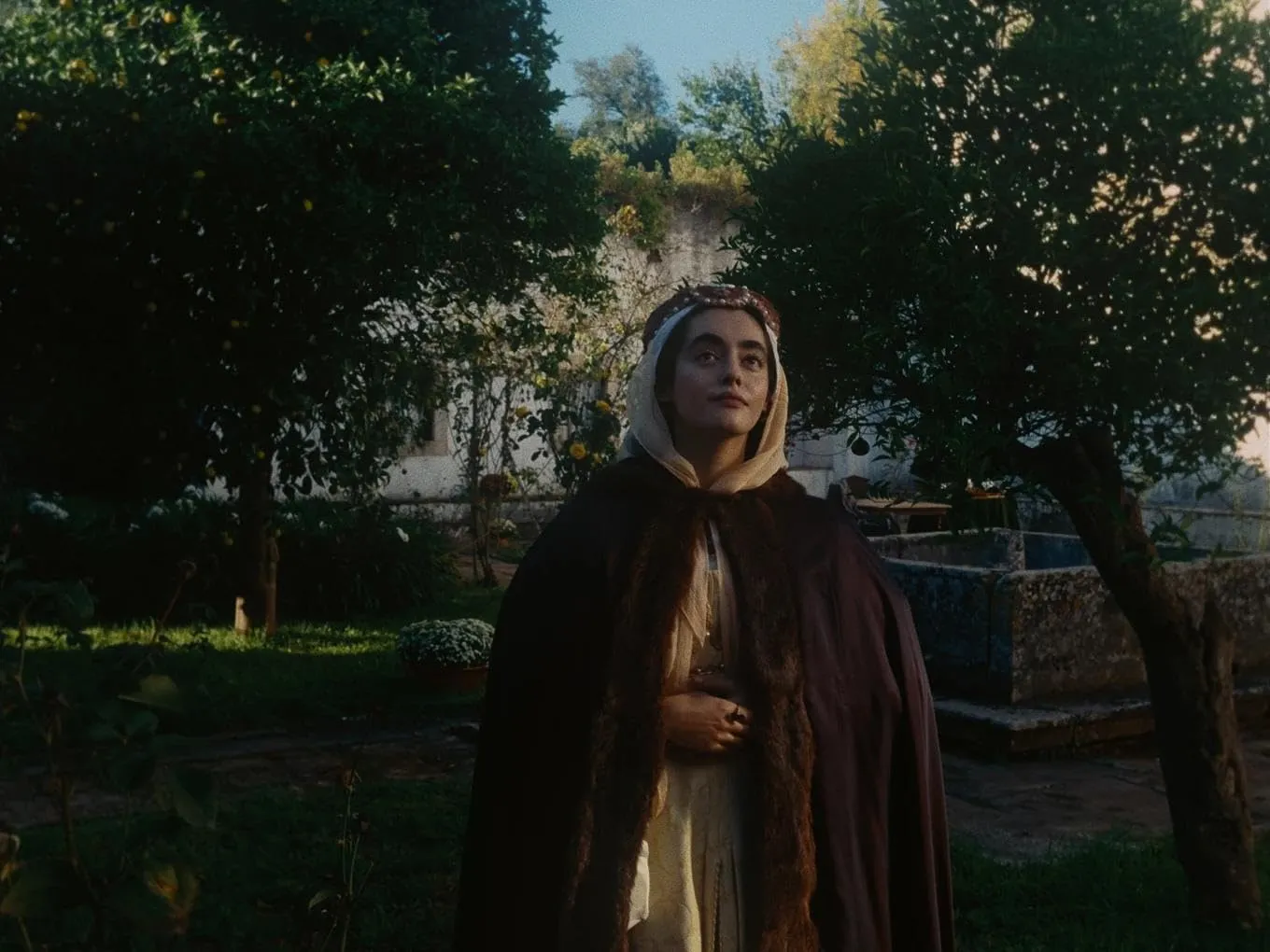Lav Diaz’s Magellan unfolds across 156 brooding minutes in a classic 4:3 frame, a chamber for souls and corpses alike. Here, Gael García Bernal embodies the infamous Portuguese navigator with a haunted restraint, his beard and bearing betraying the toll of obsession.
Opposite him, Ângela Azevedo’s Beatriz drifts through the periphery—her silent resilience a counterpoint to Magellan’s fevered purpose. Set against the humid jungles and windswept coasts of early 16th-century Southeast Asia, the film charts two great voyages: Magellan’s campaign in Malacca and his Spanish-backed quest for the Spice Islands, ending in the Philippines.
Diaz’s pacing is deliberate, each long take lingering on aftermath rather than spectacle, while bursts of tighter editing snap us from ritual chants to the washed-up bodies of a nameless battle. This is a film about ambition’s hunger—and the human toll left in its wake.
Currents of Time
Time in Magellan is a river of abrupt leaps and silent eddies. We first witness the Malacca expedition’s grim aftermath, then leap nearly two decades ahead to Lisbon’s courts and cramped ship decks. Years collapse into moments: mutinies sketched in terse montage, voyages summarized in creaking timbers and creasing maps.
Yet other scenes expand—long, unbroken takes of soldiers circling corpses, their footsteps echoing like a dirge. Title cards drop without warning, severing chants of tribal water worship from the stark image of spill-tide bodies on a shore. These sudden ruptures unsettle: we feel the weight of absence more than the heat of battle.
And when the narrative hastens—brief swoops across ocean waves—it only sharpens our awareness of the film’s slower heart, a hypnotic rhythm that forces us to dwell on each hushed insult of death.
Fragments of Light and Shadow
Diaz frames his story in a palette of earthen browns and heavy greens, the air thick with humidity and portent. Wide, stationary shots position Bernal’s figure as a lone speck amid fallen bodies, amplifying solitude and guilt.
Interior scenes shift to chiaroscuro: dim cabins and ship hulls glow with a single shaft of light, as though conscience struggles to pierce Magellan’s resolve. Violence, when it appears, comes as whispered aftermath: the camera skirts pools of blood and silent bodies, refusing to show the blade’s final stroke.
This restraint feels almost more brutal, the horror lodged in empty space rather than spilling onscreen. Symbolic echoes abound—water as both life and omen, stones carried like talismans, iron bracelets that bind more than flesh. Each frame asks: when the conqueror departs, who remains to witness the ruins of his faith?
Faces of Conquest
At the center stands García Bernal’s Magellan: measured words delivered with a hollow conviction, his eyes flickering between God’s promise and mortal doubt. He speaks in Portuguese, every syllable weighted by the film’s relentless gravity. Azevedo’s Beatriz, though nearly silent, radiates a quiet defiance—her presence a lingering ache in the hero’s periphery.
Enrique, the Tagalog-speaking slave, becomes a chorus of lament, his solitary soliloquies a reminder of lives erased. Diaz’s direction shuns grand spectacle, favoring contemplative silences and static compositions that unsettle more than any cannon blast.
Themes converge in uneasy harmony: the brutality of colonial ambition, Christianity wielded as both salvation and sword, and the precarious truth of a single narrator’s claim—Magellan’s death at Mactan—always tinged with uncertainty. In this half-told epic, history itself seems a shadow play, its brightest myths recast as dark cautionary tales.
Magellan had its world premiere at the Cannes Premiere section of the 2025 Cannes Film Festival on May 18, 2025.
Full Credits
Director: Lav Diaz
Writer: Lav Diaz
Producers: Joaquim Sapinho, Marta Alves, Paul Soriano, Albert Serra, Montse Triola, Stefano Centini
Cast: Gael García Bernal, Roger Alan Koza, Dario Yazbek Bernal, Rafael Morais
Directors of Photography (Cinematographers): Lav Diaz, Artur Tort
Editors: Lav Diaz, Artur Tort
Composer: Marc Verdaguer
The Review
Magellan
Magellan is a haunting odyssey of ambition and aftermath, where every silent frame speaks of ambition’s ruin and the quiet suffering it leaves behind. Diaz’s austere vision and Bernal’s spectral performance conjure a meditation on power, faith, and the fragile human cost beneath grand expeditions.
PROS
- Immersive, hypnotic pacing that lingers on the human aftermath
- Striking 4:3 compositions that heighten intimacy and unease
- Gael García Bernal’s restrained, haunted portrayal
- Thematic depth exploring colonialism, faith, and memory
- Poetic use of ritual and symbolic imagery
CONS
- Deliberate slowness may test viewer patience
- Abrupt temporal jumps can feel disorienting
- Beatriz’s story remains underexplored
- Absence of overt battle scenes may frustrate action seekers
